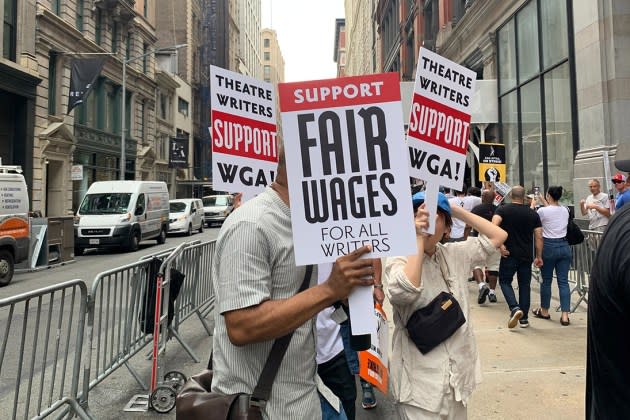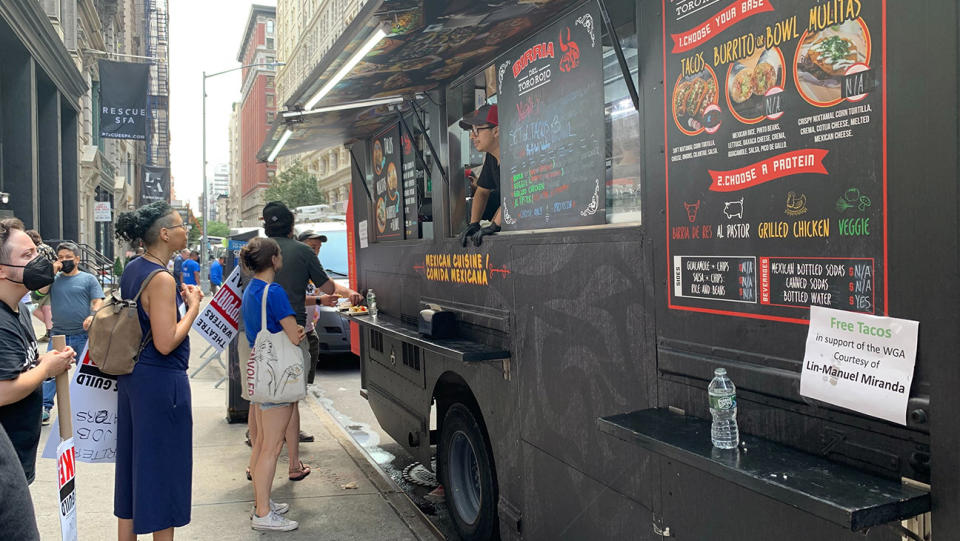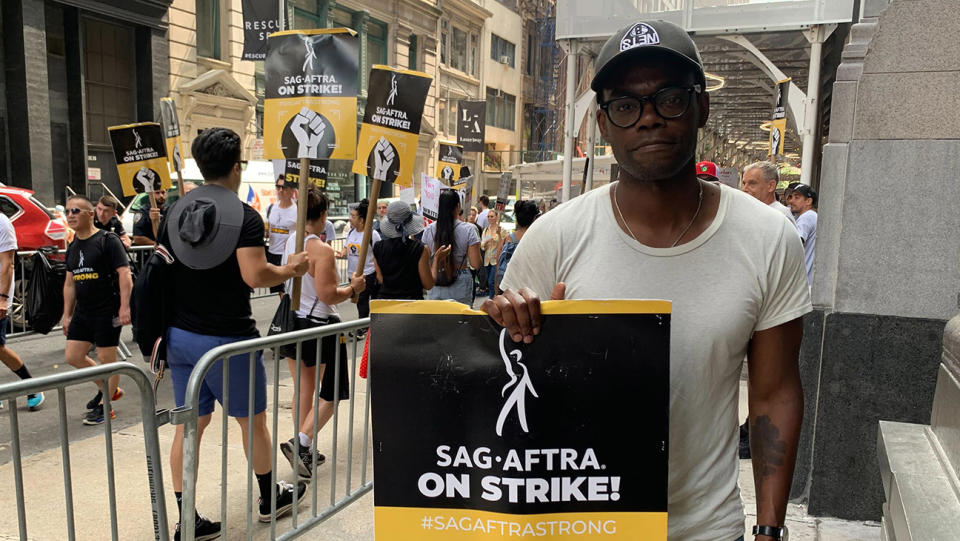Playwrights Say Financial Cushion From TV and Film Work Has Diminished: “The Rug Is Being Pulled Out”
- Oops!Something went wrong.Please try again later.

For many playwrights, film and television work has historically served as a supplement to their income from the theater world. But in recent years, writers say, studios have begun to poke holes in that safety net, leaving some stage scribes as frustrated and angry as their screenwriting colleagues.
“TV really seemed like a way to have more stability, to be able to just have a middle-class life doing the thing I love, get health insurance, support my family,” 72 miles to go … playwright Hilary Bettis said Wednesday outside Netflix’s Union Square offices in New York. “And now it feels like the rug is being pulled out from under us.”
More from The Hollywood Reporter
Ken Ziffren on Writers Strike: Tuesday's Meeting "Did Not Move the Ball Forward"
Raquel Leviss Talks 'Vanderpump Rules' Future and Fallout With Bethenny Frankel

Held as a themed Playwright Picket supported by the Writers Guild of America, the picket lines featured a free taco truck sent by Lin-Manuel Miranda and also saw members of the Dramatists Guild, the membership association for playwrights, and SAG-AFTRA — including B.D. Wong, Stephen Lang, Kathryn Erbe and William Jackson Harper — in attendance.
Bettis was there among the many writers who are intimately aware of what’s at stake if a new contract with higher wages and protections is not reached. Several tell The Hollywood Reporter they are contending with suboptimal pay rates and working conditions on the film and television side, dampening and even threatening the ability for screenwriting to not only help make ends meet but to ensure they can continue their first love: writing for the stage.
“Many of us WGA writers began in theater, and from first-time staff writer to showrunner to Oscar-winning screenwriter, playwrights have always found a home in Hollywood,” said Emmy-nominated, WGA award-winning TV and stage writer Tanya Barfield. “[So] we have a unique understanding as to why we’re here.”
While many playwrights are members of the WGA, which has been on strike since May 2, these stage writers themselves do not have a union, nor are they allowed to collectively bargain, as they own the copyright to their own work. They are not viewed legally as employees like TV and film writers, but instead as independent contractors. This status has granted playwrights a degree of autonomy and power in the theater world, but in practice has also meant that many need to turn to film and television to receive health insurance, as well as pension plans, set minimums and other benefits.
This has fueled, both in the WGAE and among the larger East Coast writing community, a large degree of crossover between the two mediums, not only because of the need for supplemental wages and benefits, but because many screenwriters are first trained in the world of theater. And prominent playwrights, such as Lynn Nottage, a two-time Pulitzer Prize winner for her plays Ruined and Sweat, fear that artificial intelligence and smaller room sizes could threaten the pipeline of playwrights to screenwriters.
“I’ve been teaching graduate playwriting since 2001, and I think about the very first class I taught — including [Industry‘s] Jami O’Brien, [The Chi’s] Marcus Gardley, [Perry Mason’s] Rolin Jones — becoming some of the most formidable showrunners in the business and how we made some space for them,” Nottage said.
“It’s going to be increasingly difficult for people who are coming out of grad school to have the same opportunities that they had because the rooms are shrinking; because the residuals are getting smaller; because it’s getting more diffuse; and because AI is threatening to replace the young writer with the machine. In many respects, that is why I’m here. I know that that world that they all entered doesn’t exist anymore,” she continued.
To that end, several Hollywood showrunners are returning to the world of theater during the strike, as the work is not covered under an AMPTP agreement and therefore included. This has included P-Valley showrunner Katori Hall, The L Word: Generation Q showrunner Marja-Lewis Ryan and Jack Ryan showrunner Steven Kan.

Being able to work on playwriting during the strike is rewarding, said Kristoffer Diaz, a Pulitzer Prize finalist playwright who is working on the new Alicia Keys musical Hell’s Kitchen opening this fall, though he cautions this does not necessarily mean there will be an abundance of new plays produced during the strike, given the long lead time for development and production.
But among these writers, there’s frustration at the lack of action they’re able to take on their own terms within the theater world.
“We’re still able to make stuff, which is an exciting thing,” Diaz said. “We’re able to get some of our favorite actors back. Some of our favorite actors who are out in Hollywood are getting to do some new play development or get to do some new plays, which is an exciting thing. And it’s great to be able to help them and put them to work a little bit. But it is a little maddening as a playwright to know that we can’t just reach a collective mass the same way that our friends who have unions can and just come out here and support and fight for what’s right. We have to do it as individuals.”
Several playwrights who spoke with THR from the picket line in New York shared growing dissatisfaction with the pay rates and lack of benefits and representation in the theater world, which they are unable to collectively change due to their status as independent contractors. This, combined with the recent contract terms for screen and television writers, has meant that many playwrights have felt squeezed from both sides.
“Actually working in two fields that have been experiencing, honestly like golden eras in each of their respective fields, it’s disheartening to feel like we’re at a place where we’re literally fighting to, in some cases, pay rent and survive,” said playwright Branden Jacobs-Jenkins, a Pulitzer Prize finalist for his plays Gloria and Everybody and showrunner of Hulu’s Kindred.
While playwrights have the advantage of being able to own the copyright and therefore protect their own content, Nottage noted there are downsides — and that’s where television writing has historically come in.
“When I go on the road, often as a writer, I’m given the worst housing because I don’t have a union to protect me,” Nottage said. “I have to fight for my per diem because it’s not a given. That’s one of the main differences. As a playwright, for many, many years I’ve had to teach. I’ve had to write my plays. I’ve had to look for whatever work I could in television just to pull together enough money to sustain me. And mostly I was working in television for health benefits.”
The theater world and the WGA were temporarily at odds at one point during the strike, with the WGA originally denying the Tony Awards a waiver to air the awards show and then later asking WGA members who were nominated not to attend the broadcast. The members ended up attending after the Dramatists Guild counseled them to attend and voice support for the writers.
“There were lots of conversations going on, and everybody I think was really in the same mindset of the bottom line, which is doing the right thing for writers, doing the right thing for each other and finding the ways to make sure that we can keep those those shows that were on Broadway that were in need of the Tony boosts happening,” said Diaz, who is secretary of the Dramatists Guild, but was speaking as an individual.
Regardless of where the contract negotiations end up, there will likely continue to be a large degree of overlap between the worlds of stage and screen. And, as noted by The Good Place star William Jackson Harper, who recently appeared in off-Broadway play Primary Trust and is also a playwright, there will likely be the need for bigger names to continue speaking up for those still trying to make ends meet between both worlds.
“A lot of us have managed to find a way to piece together a decent living and be out here and use our voices as much as we can for the folks that are still in that space of having to piece things together,” Harper said.
Best of The Hollywood Reporter

